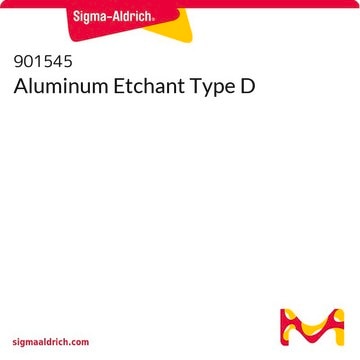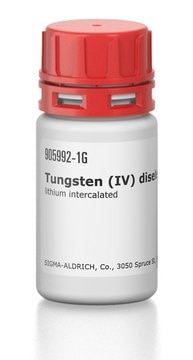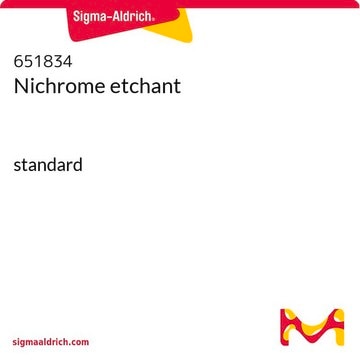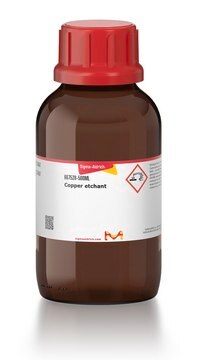Recommended Products
Quality Level
Related Categories
General description
Tungsten etchant is a mixture of potassium hydroxide and potassium ferricyanide based solution that facilitates the removal of tungsten and other materials like aluminium by dipping the substrate into the etching solution.
Application
Selective etchants for tungsten thin-film metallizations used in semiconductor and microelectronics technology. Etchants are buffered, mildly alkaline ferricyanide-based formulations providing high resolution patterns with minimal undercutting and photoresist compatibility. Etchant is ready to use (no dilution required). Controlled, uniform etching is achieved by immersion or spray etch technique. Etch Capacity (rate declines at ∼70%) of 64 g/gallon. Recommended Operating Temperatures: 20-80 °C (30-40 °C most common).
Preparation Note
- 20°C = 30 Å/second
- 30°C = 140 Å/second 20°C = 80 Å/second
- 60°C = 250 Å/second
signalword
Danger
hcodes
Hazard Classifications
Aquatic Chronic 3 - Eye Dam. 1 - Met. Corr. 1 - Skin Corr. 1A
supp_hazards
Storage Class
8B - Non-combustible, corrosive hazardous materials
wgk_germany
WGK 2
flash_point_f
Not applicable
flash_point_c
Not applicable
ppe
Faceshields, Gloves, Goggles, type ABEK (EN14387) respirator filter
Certificates of Analysis (COA)
Search for Certificates of Analysis (COA) by entering the products Lot/Batch Number. Lot and Batch Numbers can be found on a product’s label following the words ‘Lot’ or ‘Batch’.
Already Own This Product?
Find documentation for the products that you have recently purchased in the Document Library.
Pattern processing results and characteristics for SCALPEL masks.
Novembre AE, et al.
Microelectronic Engineering, 46(1-4), 271-274 (1999)
Microstructure Evolution of W-Cu Alloy Wire.
Shao F, et al.
Materials Sciences and Applications, 3(03), 157-157 (2012)
Electrostatically actuated copper-blade microrelays.
Lee H, et al.
Sensors and actuators A, Physical, 100(1), 105-113 (2002)
Our team of scientists has experience in all areas of research including Life Science, Material Science, Chemical Synthesis, Chromatography, Analytical and many others.
Contact Technical Service





